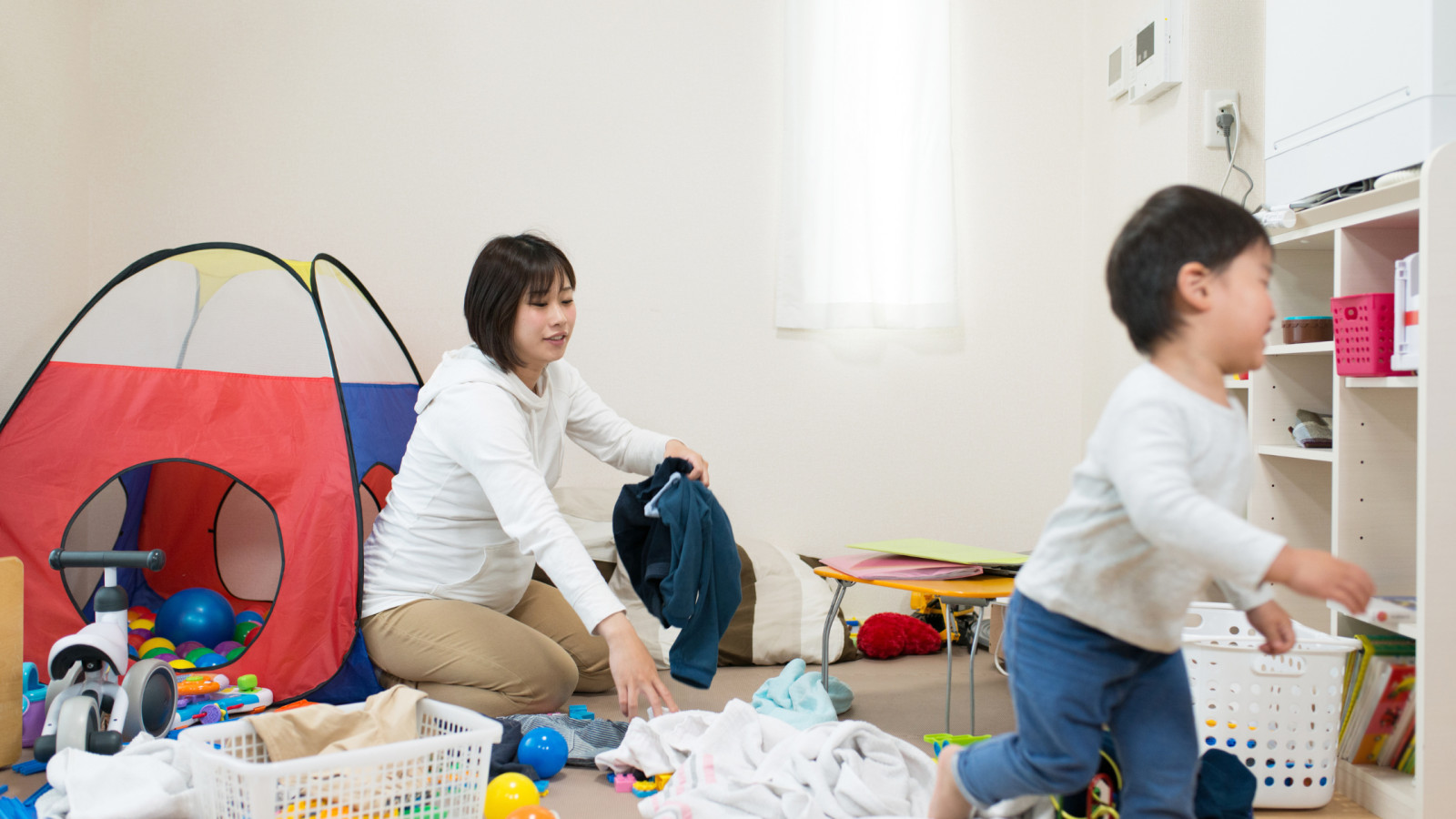
In this blog post, the author emphasizes the importance of emotional intelligence and offers practical tips for regulating our nervous system and strengthening the Vagus Nerve. The article explains that constant stress can impair our ability to regulate emotions and teach our children to do the same. The analogy of the nervous system as a superhero, with the Vagus Nerve serving as a calming sidekick, is used to illustrate how stress affects our body. The post provides various activities for strengthening the Vagus Nerve, such as deep breathing exercises and yoga, as well as calming the nervous system through activities like listening to calm music and engaging with nature. The author encourages readers to incorporate these practices into their daily routine to improve their ability to handle stress and achieve a sense of calm in their lives.
Read more...
As mothers, we often find ourselves in a constant juggling act, trying to maintain order and balance in the midst of daily chaos. We dream of being the perfect mothers, seamlessly managing every aspect of our children's lives while also keeping our homes in pristine condition. But the reality is far from perfect. Many of us work, and these days lives are busier than ever. Truth be told, the chaos can feel overwhelming.
So just how do we get the balance right? How do we ensure everybody's needs are met (including our own) whilst ensuring bills are paid, meals are cooked, rooms are tidy and everyone gets to school on time?
Here's a quick guide to achieving that elusive equilibrium:
1. Let Go of the Illusion of Perfection
First and foremost, it's essential to release the notion of being a perfect mother. Perfection is an unattainable goal that only adds to our stress. Understand that it's okay to make mistakes, and your children will love you even more for your authenticity.
Furthermore, it is impossible for us to do it all.
Instead of trying to do it all perfectly, focus on one small area and do that well instead.
So, instead of trying to get the house tidy, do a whole week's worth of batch cooking, whilst playing and engaging with your children, focus on one thing. Want to be fun mum for a day? Accept that the house will be messy. Need to be productive? Let the children spend some time on their own, even put them in front of the TV for a bit longer than usual to get them out of your hair. Lower your expectations of having to be super human and you will notice that you can excel at one thing more, whilst feeling like a better mum in the process.
2. Prioritise Self-Care
This is one that as mothers we hear over and over again. But just how do we make time for ourselves when we don't even have time for our kids?
MAKE TIME FOR YOURSELF AS IMPORTANT AS EATING AND GOING TO THE TOILET! SCHEDULE IT.
Self-care is crucial for maintaining balance. When you care for yourself, you're better equipped to care for your family. The best way I do this for myself is to block out time in my calendar. If someone asks me to do something when I am meant to be going for a walk, I will simply tell them I am busy. If time to yourself is a foreign concept, start small. 10 minutes a day. Build up to longer periods.
When your children see you prioritising yourself, they will grow up understanding that this is an important part of living a happy, well balanced life.
3. Embrace Controlled Chaos
If you are anything like me, you will find a messy bedroom hard to deal with. I have learned to overcome my control to have things just as I like it by asking myself this very simple question:-
Whose problem is it? If it is your problem, you can choose to let it go.
Is a messy room my kids' problem, or is it my problem. Is the fact that they decided to go out without a jacket their problem or my problem?
Most issues I have are not my kids' problem. They are mine. When I find that the problem is mine, I get to choose whether I can park it for now, or deal with it. It is all about picking my battles. And so I have learned to let things go, so I can focus on connection and fun when the time sees fit.
4. Get clear on your values
With regards to family, what is truly important to you? Here are a list of values which may or may not resonate:-
Empathy, respect, perseverance, contribution, free choice, fairness, teamwork,
compassion, courage, integrity, resilience, honesty,
kindness, patience, generosity,
As a family, work out what your 5 top values are. Then use these to help guide your parenting, holding boundaries in place which reflect them.
When you are clear on your values as a family, decisions become easier, boundaries make more sense and everyone becomes united in working together to live by these values.
A noteworthy point to make is that some of our values are aspirational. We may for instance think we value respect, but it is only a value we want to see from our children. If we shout at them for not respecting our rules etc, we are not living the value of respect, as we are not showing this to our kids. When we value respect everyone shows mutual respect for each other by listening, honouring and acknowledging each other.
5. Set Realistic Expectations
Learn to prioritise, understand your limits and set achievable expectations.
1. What expectations are you setting of yourself. What can you achieve in a day? What do you need to let go of?
Be realistic of your limitations and be kind to yourself.
You are not superhuman! Outsource where you can and seek support.
2. What expectations are you setting of your children? If they are 5 and you are expecting them to tidy their room on their own, is this realistic?
Learn about your children's stages of development and what they are capable of.
When it comes to tidying up, children up to the age of 7 need an awful lot of guidance, and the best way to get them to do chores is to do it with them. Begin to understand them more and then set your expectations based on their abilities. You will soon notice a difference.
6. Be mindful
Mindfulness can help you stay grounded amid the chaos. Put away your devices. Practice being present in the moment, whether you're playing with your children, doing chores, or having a family meal. Mindfulness can help you appreciate the small joys in daily life.
9. Build a supportive community
It takes a village to raise a child. You're not alone in your journey. Reach out to other mothers for support and advice. Have regular catch ups with a group of like minded people. Sharing experiences and learning from others can be incredibly comforting and enlightening.
10. Celebrate Achievements
Don't forget to celebrate your successes, no matter how small they may seem. Whether it's a peaceful evening or a well-behaved shopping trip, recognise and reward both your efforts and your children's achievements.
Balancing control and chaos in motherhood is an ongoing process. It's about finding harmony in the beautiful mess of family life, learning to let go, and embracing the joyful moments that come your way. Remember, a happy home is not defined by perfection but by love, laughter, and the memories created.
Drop me a comment below to share with likeminded women tips and tools you use with your family to find that balance between control and chaos.
Need more support in getting on top of the overwhelm? I would be more than happy to be a listening ear. Book in a FREE 20 min chat with me here.
 I have been contemplating for a few years now why so many more of our kids these days struggle with mental health issues, why we find it so hard to get the balance right in parenting with firmness and kindness, and why the world is currently such a complicated and overwhelming place to live.
I have been contemplating for a few years now why so many more of our kids these days struggle with mental health issues, why we find it so hard to get the balance right in parenting with firmness and kindness, and why the world is currently such a complicated and overwhelming place to live.And then it hit me. I was sitting in an auditorium listening to the beautiful Dr Vanessa Lapointe talk about how we can help kids thrive, when she mentioned that word: CONNECTION. Now, I have myself spoken many times about the importance of connection, so there was nothing new in what she was talking about. Still, something in what she said brought it home to me so strongly that I sat there stunned for a while.
Human beings are SIMPLE. We all strive to BELONG; to be LOVED, to CONNECT, and to feel SAFE. When we achieve these things we can thrive, be successful and build healthy relationships, because we come from a place of GIVING rather than from a place where we need to TAKE from others in order to feel complete.
The problem with that, of course, is that we are not perfect, whole human beings. We come with scars, trauma, and insecurities from our past which largely define how we parent our own children. We raise them with good intentions. We want them to have what we didn't have. We want them to feel loved, to feel happy, to be resilient, to feel confident. We want the world for them. And we do the best that we can with the tools and resources that we have at the time.
The catch is that when we raise children with pain from our own past, this pain will inevitably emerge when we least expect it to, mostly during times when our children test us because they are acting out. Enter power struggles, shouting, nagging, and all sorts of bad behaviour from us (yes - us) because - guess what? - we are ultimately just having a 5 year old meltdown in an adult body, just because our children won't listen to us.
We live in a hugely fast-paced world. We spend a large amount of time on devices, our schedules are super busy, our kids have extra curricular activities up to their eyeballs, and many of us have lots of 'stuff'. Because there is so much 'stuff', they don't hold as much value and if we don't like something we can change it - pretty much instantly.
We are so consumed with external things, being busy, achieving, that we have lost sight of what is crucial to our survival as a species; CONNECTION. In fact, many of us have even lost the ability to do so, resorting to social media, drugs, alcohol, shopping, in order to fill a need which we no longer know how to fill.
Is there any wonder anxiety is on the rise?
To be a good parent we need to relearn how to connect, not only with our kids, but with ourselves. In fact, connecting with ourselves needs to be at the heart of our parenting. When we can connect with ourselves, we can tune into our own feelings and needs. We can learn to love ourselves and give ourselves compassion and kindness. And then, when we have connected with ourselves, we can finally begin to parent our own kids from the heart.
Here are 4 things you can do to connect with yourself
1. Rediscover Your Authentic Self
Before we can expect to connect deeply with our children, we must first reconnect with our own authentic selves. Modern life often leads us to conform to societal norms and expectations, losing touch with our true desires, passions, and beliefs. By dedicating time to self-reflection and introspection, we can align ourselves with our core values, allowing us to show up as our genuine selves and model authenticity for our children.
2. Cultivate Emotional Well-being
Children are intuitive and perceptive beings who can sense the emotional state of their parents. When we are disconnected from ourselves emotionally, our ability to effectively support our children's emotional well-being is compromised. Taking the time to prioritise self-care, engage in activities that bring us joy, and process our emotions helps us become emotionally available for our kids. By modeling healthy emotional expression, we create a safe and open space for our children to share their own thoughts and feelings.
3. Lead by Example
Children learn by observing the behaviour of their parents. When we prioritise self-connection, we demonstrate the importance of self-awareness, self-compassion, and personal growth. By engaging in activities that promote self-reflection, such as journaling, meditation, or engaging in hobbies, we inspire our children to explore their own interests, develop their identities, and embrace the power of self-reflection.
4. Foster Effective Communication
Meaningful connections are built upon open and effective communication. By strengthening our self-connection, we enhance our ability to communicate authentically and empathetically with our kids. This allows us to truly listen to their needs, concerns, and desires, creating a nurturing environment where their voices are validated and respected. When our children feel heard and understood, they readily turn to us for guidance and support.
Once you can fully connect with yourself by practicing self-love and compassion, only then can you start to truly connect with your children.
So how do you connect with your children?
1. Get Curious
Ask yourself, what makes them tick? What is their behaviour telling you that they need? What support do they need? Tune into them and get curious. Curiosity will allow you to see your child for who they are and in turn they will feel heard and seen.
2. Join in
Observe your child. What do they really love doing? Forget about putting your ideas onto them. Give them space to show you and tell you what they are passionate about. Join in their activities. If it's dinosaurs, do a little bit of role play. If it's gaming, show an interest in their games rather than constantly telling them to get off their screens. When you have connected with them this way, they will be more open to doing things for you when the time arises.
Remember, as we invest in our own self-connection, we provide our children with an invaluable gift of having connected, present, and engaged parents who will help shape their future in the most positive way possible, whilst being able to connect with them on a much deeper level because we are parenting from the heart.
DO YOU NEED HELP CONNECTING WITH YOURSELF AND YOUR KIDS?







